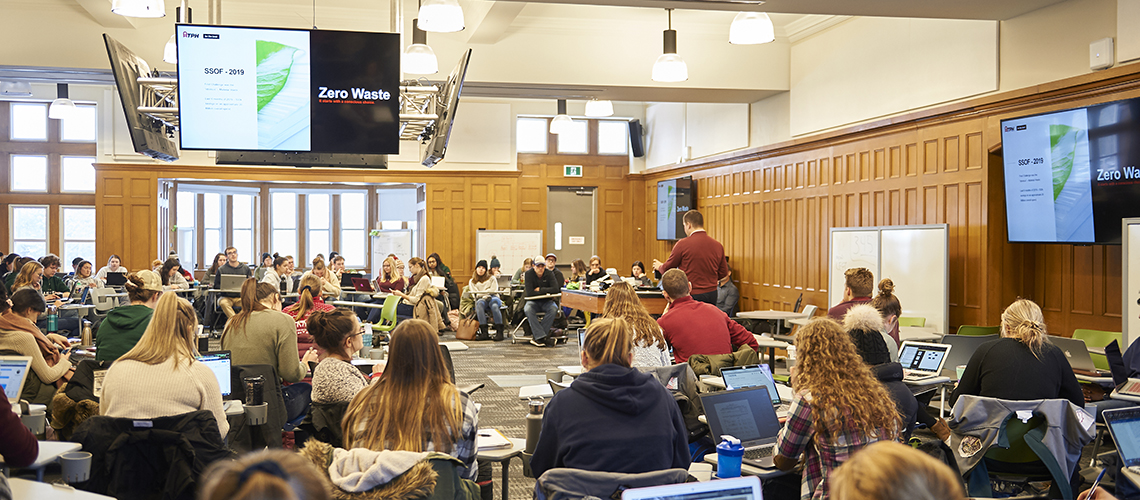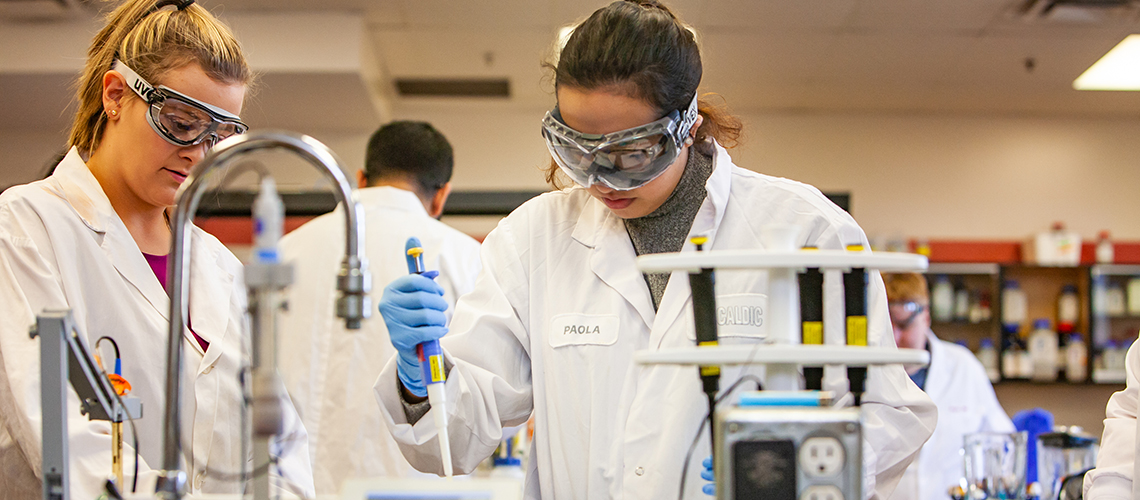How to Choose Food Programs at U of G
When I settled on pursuing studies in food and agriculture at the University of Guelph, I had to then narrow down my interests to select a major.
I found myself on the U of G website many evenings after school reading up on the various agri-food programs offered. I quickly learned – by reading through program details and course descriptions - just how vast the food industry and the many career opportunities that are possible. It’s no wonder the University of Guelph is termed “Canada’s Food University”. (No seriously, type “Canada’s Food University” into Google!)
During my research, my eyes were opened to the economics of agri-food and this really appealed to me! Ultimately, I ended up in the B.A. FARE program and I am extremely happy with my choice.
I was intrigued by three programs in particular – Food Industry Management, Food and Agricultural Business and Food, Agricultural and Resource Economics. In this post I will walk through these programs from a student’s perspective to showcase their differences and hopefully help other students when selecting one of these amazing food programs offered at Canada’s Food University!
Food and Agricultural Business (FAB)

When I sent in my application to the University of Guelph, I applied to the Bachelor of Commerce degree program, majoring in Food and Agricultural Business.
In this program students get the opportunity to explore many areas of management and its relation to food and agriculture. This program appealed to me the most because it seemed to present the most varied job opportunities after graduation.
I was also really excited by the course listing for this program, which ranged from economics and finance to organizational behaviour and policy planning. I also appreciated the co-op opportunity.
When I selected this program, I was hoping to lead a career in agribusiness management, which FAB is perfect for. This program might be the right fit for you if you are interested in working in business or being an entrepreneur.
Career opportunities seem endless with this FAB degree. To name a few:
- Agricultural Commodity Trader
- Agronomy Specialist
- Marketing Coordinator
- Procurement Agent
- Agricultural Development Advisor
After my first year, I quickly realized the agribusiness route was not for me. I was not interested at all in accounting and finance, which is a huge component of agribusiness management!
But I enjoyed the economics courses. I sat down with my program counsellor to discuss my options for switching programs. After a few consultations with my counsellor I decided to switch into Food, Agricultural and Resource Economics.
Side note: It is perfectly fine to switch or consider switching programs! The program counsellors are here to guide your decision and support you in weighing your options. Never hesitate to reach out to them and explain your thoughts and concerns about your program, academic goals and career aspirations!
Food, Agricultural and Resource Economics (FARE)

The Bachelor of Arts degree, FARE major was always pretty high up on my list of food programs that I was considering. After speaking with the program counsellor and re-evaluating my career aspirations, I grew to appreciate this unique and flexible program. The FARE program seamlessly reinforces concepts of economic theory, market analysis and emerging issues in agri-food and resource management.
I now hope to lead a career in policy development in the agri-food sector. This program might be the right fit for you if you are looking to work for a government, non-profit or organization. Other career opportunities available to graduates from the FARE program include:
- Community Developer
- Agri-food Economist (government or private)
- Farm management consultant
- Trade Policy Analyst
- International Development Specialist
I like the fact that I was able to choose a specialization in the FARE program. The three thematic streams are Food and Agribusiness Management, International Agricultural Development Economics, and Resource Economics. I chose to specialize in International Agricultural Development Economics, but the program is flexible enough for me to take courses from the other specializations.
Also, the fact that it is an B.A. program allows me to take other interesting courses. This can span from music to history to geography courses, which I’ve all enjoyed so far!
Food Industry Management (FIM)

When I realized I wanted to leave the FAB program, FIM was a program that I had my eye on during my search for another major that ‘fit’ me. It is a new major of the Bachelor of Bio-Resource Management degree, which focuses on combining business with science.
Food Industry Management is an interdisciplinary program that bridges food science and business management, so it might be the right fit for you if you love science but don’t want to work in a lab or research setting. The career opportunities for FIM graduates are also broad and exciting:
- Research and development manager
- Food and beverage processing manager
- Quality assurance supervisor
- Supply chain specialist
- Food product developer
- Food safety quality supervisor
I think it is safe to consider FIM as the best of both worlds if you are stuck between pursuing something on the science or business side of food. Students are exposed to the core sciences before deepening their understanding of food science. Business and managerial skills are also developed, and emphasis is later placed on topics like supply chain management, operations, food safety, food processing, marketing and more!
Food Science - An important honourable mention!

This program also stood out to me during my research before applying to UofG. It’s focus on chemistry, microbiology and lab-style learning make me realize that it did not quite match up with my personality and career goals, but the research and careers that come out of this program are vital to the food industry. Proper food safety and quality is extremely important to maintaining human health and nutrition! The Food Science major of the Bachelor of Science degree program is definitely worth considering if you are interested in creating new food products or ensuring our current food is nutritious, delicious and affordable.
Deciding broadly on a field of study can be difficult. Having to narrow down even more to choose a major is even more challenging! But remember, all of these programs are comprehensive and structured in a way that give you expert knowledge, but would also give you the opportunity to develop teamwork, leadership and communication skills. And, you can transfer programs (like me) if you realize there is a better fit for you and your interests!
Food and agriculture careers are broad and rapidly changing based on new knowledge and research. As an agri-food grad you will have an enormous task ahead of you, whether it be managing food supply chains, advising finances for farms, coordinating agri-food marketing or something totally different! It’s very possible that the job you get after graduation will be one that you didn’t even know existed.
Hopefully this helped you in your decision to study agri-food at U of G but be sure to reach out to the OAC Liaison team to ask questions about the programs you are interested in! You can contact the OAC Liasion team here.
Also, read the student profiles of current students and review the details of the program’s course requirements. Links below:
- FAB Student Profile
- FAB Undergraduate Calendar
- FARE Student Profile
- FARE Undergraduate Calendar
- FIM Undergraduate Calendar
- FIM Student Profile
- FOOD Student Profile
- FOOD Undergraduate Calendar
There is room for you here, and support for choosing the program that fits you best, at Canada’s Food University!
In this series of blog posts, OAC students take us through some of the ups and downs of their journeys at the University of Guelph.